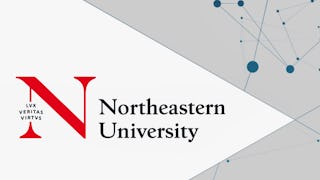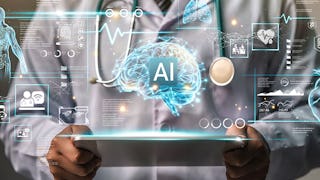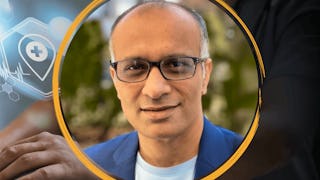AI is reshaping healthcare delivery—from enhancing diagnostics with machine learning to streamlining administrative workflows and optimizing treatment decisions through predictive analytics. This course, AI Innovations with Open Tools in Healthcare Processes, empowers healthcare professionals, AI engineers, and medical researchers to harness open-source frameworks for building scalable, ethical, and interoperable AI solutions.


您将学到什么
Explain the basics of AI and its practical applications in healthcare.
Build and use AI-assisted tools for diagnosis, documentation, and patient monitoring.
Create nursing reports and care plans using ChatGPT.
Recognize legal, ethical, and safety considerations of using AI in clinical environments
您将获得的技能
- Medical Imaging
- Open Source Technology
- Health Informatics
- Health Technology
- Applied Machine Learning
- AI Personalization
- Clinical Informatics
- Decision Support Systems
- Healthcare Industry Knowledge
- Health Insurance Portability And Accountability Act (HIPAA) Compliance
- Data Ethics
- Patient Communication
- Healthcare Ethics
- Health Care Procedure and Regulation
- ChatGPT
- Medical Coding
- Artificial Intelligence
- Automation
- Responsible AI
- General Data Protection Regulation (GDPR)
要了解的详细信息
了解顶级公司的员工如何掌握热门技能

该课程共有6个模块
In this course, you’ll explore how artificial intelligence is reshaping healthcare by combining open-source tools with real-world clinical workflows. You’ll focus on translating cutting-edge AI into actionable healthcare practices, from diagnostics and treatment optimization to workflow automation and patient care enhancement. Through concise expert-led videos, hands-on demonstrations, and open-source frameworks, you’ll gain the skills to design, deploy, and govern scalable AI healthcare solutions. By the end, you’ll be equipped to overcome fragmented data challenges, ensure ethical and regulatory compliance, and deliver AI-driven processes that improve outcomes, reduce costs, and advance accessible healthcare innovation.
涵盖的内容
1个视频1篇阅读材料
In this module, you’ll explore how artificial intelligence is reshaping healthcare practices, systems, and patient care. You’ll examine the fundamentals of AI, how it differs from traditional rule-based systems, and why it has become a vital tool in modern medicine. You’ll analyze real-world applications in imaging, predictive analytics, and administrative workflows, while also addressing common myths and risks associated with AI in clinical environments. Finally, you’ll evaluate AI’s role as a supportive tool that empowers healthcare professionals, enhances efficiency, and safeguards patient outcomes.
涵盖的内容
10个视频1篇阅读材料1个作业1次同伴评审1个讨论话题
In this module, you’ll explore the ecosystem of open-source AI tools driving innovation in healthcare. You’ll examine the principles and value of open-source frameworks, compare them to proprietary models, and evaluate their role in advancing medical research and clinical adoption. You’ll gain hands-on exposure to real-world applications like ChatGPT, Symptoma, and Glass AI for documentation, triage, and diagnosis. Finally, you’ll practice working with public datasets and no-code platforms such as Teachable Machine, learning to build simple AI models while applying best practices for data privacy and compliance.
涵盖的内容
10个视频1篇阅读材料1个作业1次同伴评审1个讨论话题
In this module, you’ll explore practical applications of AI across core healthcare processes, from diagnostics and patient monitoring to hospital operations and clinical support. You’ll examine how AI enhances imaging interpretation, supports early disease detection, and integrates with wearable devices for real-time monitoring and predictive care. You’ll analyze how smart assistants, chatbots, and workflow automation improve hospital efficiency while reducing clinician burden. Finally, you’ll gain hands-on experience using ChatGPT to simulate patient conversations, equipping you with tools to enhance documentation, care planning, and patient interaction in clinical practice.
涵盖的内容
10个视频1篇阅读材料1个作业1次同伴评审1个讨论话题
In this module, you’ll explore how AI-powered Clinical Decision Support Systems (CDSS) enhance real-time clinical decision-making. You’ll examine the structure, types, and benefits of CDSS, comparing knowledge-based and AI-driven approaches in critical care. You’ll also evaluate key safety, legal, and regulatory issues surrounding AI in healthcare, including compliance with HIPAA and GDPR and global governance initiatives. Finally, you’ll assess the ethical challenges of bias, fairness, and explainability, and apply principles of responsible AI deployment to ensure trustworthy, transparent, and equitable use of CDSS in clinical practice.
涵盖的内容
10个视频1篇阅读材料1个作业1次同伴评审1个讨论话题
In this wrap-up module, you’ll consolidate your learning by reviewing the integration of AI into healthcare processes and reflecting on its impact on clinical practice and operations. Finally, you’ll showcase your ability to translate open-source AI concepts into practical, hands-on healthcare applications, preparing you to implement innovative solutions in real-world settings.
涵盖的内容
1个视频1次同伴评审
提供方
从 Health Informatics 浏览更多内容
 状态:预览
状态:预览Northeastern University
 状态:免费试用
状态:免费试用 状态:免费试用
状态:免费试用 状态:免费试用
状态:免费试用Coursera
人们为什么选择 Coursera 来帮助自己实现职业发展




常见问题
To access the course materials, assignments and to earn a Certificate, you will need to purchase the Certificate experience when you enroll in a course. You can try a Free Trial instead, or apply for Financial Aid. The course may offer 'Full Course, No Certificate' instead. This option lets you see all course materials, submit required assessments, and get a final grade. This also means that you will not be able to purchase a Certificate experience.
When you purchase a Certificate you get access to all course materials, including graded assignments. Upon completing the course, your electronic Certificate will be added to your Accomplishments page - from there, you can print your Certificate or add it to your LinkedIn profile.
Yes. In select learning programs, you can apply for financial aid or a scholarship if you can’t afford the enrollment fee. If fin aid or scholarship is available for your learning program selection, you’ll find a link to apply on the description page.
更多问题
提供助学金,
¹ 本课程的部分作业采用 AI 评分。对于这些作业,将根据 Coursera 隐私声明使用您的数据。






